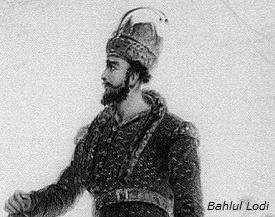
- Medieval Indian History Tutorial
- Medieval Indian History - Home
- Kingdoms of North India
- The Rajputs
- The Invaders
- Delhi Sultanate
- The Khilji Sultans
- Tughlaq Sultans
- Lodi Sultans
- New Kingdoms
- Religion
- The Sikh Movement
- Babur’s Advent into India
- Major Battles
- Significance of Babur's Conquest
- Humayun’s Conquest
- Humayun’s Downfall
- Sur Empire
- Akbar the Great
- Early Phase of Akbar’s Reign
- Expansion of Mughal Empire
- Akbar’s Administrative System
- Akbar’s Organization of Government
- Akbar’s Relation with Neighbours
- Rebels during Mughal Empire
- Deccan & South India
- Conquest of South – I
- Conquest of South – II
- Deccan’s Cultural Contribution
- Political Development Mughals
- Nur Jahan
- Shah Jahan’s Rebel
- Mughals’ Foreign Policy
- Mansabdari System
- Social Life under the Mughals
- Nobles & Zamindars
- Trade & Commerce
- Mughals’ Cultural Developments
- Language, Literature & Music
- Religious Ideas & Beliefs
- Problems of Succession
- Aurangzeb’s Reign & Religious Policy
- North-East India
- Popular Revolts & Movements
- Rise of Maratha
- Administrative System of Shivaji
- Aurangzeb & Deccani States
- Reference and Disclaimer
Medieval Indian History - Lodi Sultans
Lodi Dynasty came after Sayyid dynasty and ruled until A.D. 1526.
Lodi Dynasty (1451–1526)
Lodi dynasty was originally from Afghan who ruled Delhi Sultanate for about 75 years.

Bahlul Lodi
Bahlul Lodi, who founded the dynasty and ruled Delhi from 1451 to 1489. After his death in 1489, his second son Sikandar Lodi succeeded the throne.
Sikandar Lodi
Sikandar Lodi took the title of Sikandar Shah. It was Sikandar Lodi who founded Agra city in 1504 and moved capital from Delhi to Agra.
Sikandar Lodi, further, abolished the corn duties and patronized trade and commerce in his kingdom.
Ibrahim Lodi
After Sikandar Lodi, Ibrahim Lodi (the youngest son of Sikandar Lodi) became sultan. Ibrahim Lodi was the last ruler of Lodi dynasty who ruled from 1517 to 1526.

Ibrahim Lodi was defeated by Babur in 1526, in the first battle of Panipat and from now Mughal Empire established.
Lodi Administration
The Lodi kings tried to consolidate the Sultanate and attempted to curb the power of rebellious governor.
Sikandar Lodi who ruled from 1489-1517, controlled the Ganges valley up to western Bengal.
Sikandar Lodi moved capital from Delhi to Agra, as he felt that he could control his kingdom better from A gra. He also tried to strengthen the loyalty of the people by various measures of public welfare.
The Nobles
During the sultanate period, the nobles played a powerful role. Sometimes, they even influenced state policy and sometimes (as governors), they revolted and became independent rulers or else usurped the throne of Delhi.
Many of these nobles were Turkish or Afghani, who had settled in India.
Some of the nobles were men who came to India only in search of their fortune and worked for the Sultan.
After Ala-ud-din Khilji, Indian Muslims and Hindus were also appointed as officers (nobles).
The Sultan followed the earlier system of granting the revenue from a piece of land or a village to the (noble) officer instead of paying them salary.